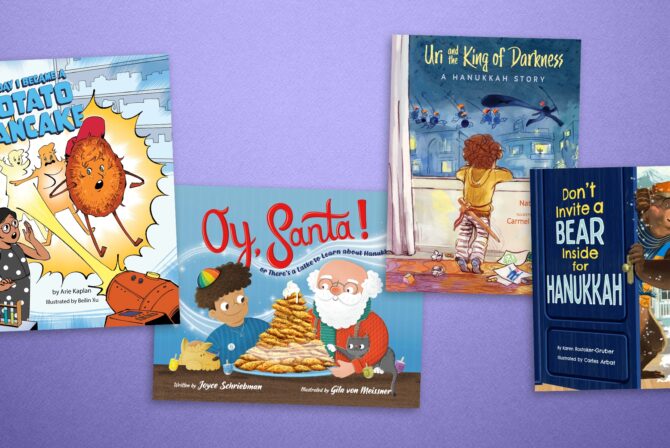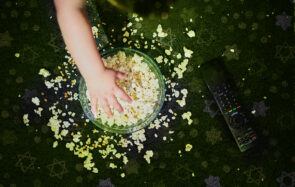Last week’s episode of The Big Bang Theory was called “The Isolation Permutation,” and it was about my character, Amy Farrah Fowler feeling left out by her girlfriends. She spirals into a depression that includes playing “Everybody Hurts” on the harp (yes, it was really me playing), getting drunk in a liquor store parking lot (no, I wasn’t really drunk) and attempting to seduce Sheldon, her “not-boyfriend” (settling instead for possibly the most awkward cuddle in sitcom history).
The episode pulled in our third highest ratings ever, with 16 million people in America tuning in, and despite one reviewer noting that I am “not as attractive as Kaley Cuoco or Melissa Rauch” but am still amazing, the reviews were glowing and it’s super exciting.
You might be interested to know, however, that I was not watching along with the millions of Americans who tuned in. You see, I hate watching myself on TV. I hate hate hate hate hate it. I hate how I look, I hate how my voice sounds (kind of like Bea Arthur on a hoarse day), and I hate how my body looks bumpy, lumpy, and androgynous under several layers of over-sized clothes designed to hide my lady-like curves.
I am a very technical actor, and I am overall very tuned in to timing, editing, and camera shots of the scenes I participate in. So if lines are edited out, or if lulls in dialogue which we use as transitional gaps for acting purposes get clipped by editors, it doesn’t match what I experienced when I filmed, and I don’t like that. When things look, sound, or feel different on TV than they were when I performed them, it feels wrong. Wrong how? Wrong in the way that people with OCD get a “wrong” feeling when they can’t flip switches the “right” number of times. It’s just really really wrong.
 The most significant reason I don’t watch myself, though, became very clear to articulate this past week when I did in fact see “The Isolation Permutation” as it was aired on our set for our studio audience a few days before TV viewers saw it. I watched along with our studio audience and I cringed throughout. Specifically, during the scene where my character seduces Sheldon. Performing that scene was by far the most interesting, gratifying, intense, and exciting scene I think I have ever performed as an actor. I don’t mean to wax poetic about my “thespian process,” but what I do is not done lightly. I take my work very seriously, and I work hard to create emotions and responses from audiences, as well as from the actors I work with.
The most significant reason I don’t watch myself, though, became very clear to articulate this past week when I did in fact see “The Isolation Permutation” as it was aired on our set for our studio audience a few days before TV viewers saw it. I watched along with our studio audience and I cringed throughout. Specifically, during the scene where my character seduces Sheldon. Performing that scene was by far the most interesting, gratifying, intense, and exciting scene I think I have ever performed as an actor. I don’t mean to wax poetic about my “thespian process,” but what I do is not done lightly. I take my work very seriously, and I work hard to create emotions and responses from audiences, as well as from the actors I work with.
Working alongside two-time Emmy winner Jim Parsons is unlike working with anyone I have shared a stage with. He and I go about our work very similarly, from how we view our characters’ idiosyncrasies, to how we execute them. Jim and I also seem to agree–all of this is unspoken–that no amount of preparation all week can brace you for the lovable beast that is a live studio audience. You can’t really know how to play a scene until you can hear the audience gasping, giggling, laughing, and hesitating; breathing with you as you breathe and feel the nuances of your character. The way the failed seduction/cuddle scene shook down on your TV screens was, for me, different by eons from how it played all week in rehearsal.
All week, the laughs were shaky from our crew and writers. The characters’ intent was under negotiation in fascinating ways, and I honestly began to doubt my ability as an actor to pull it off. But in front of the audience, it came to life; a creative force was summoned almost magically to save the day; it was as if our own personal Golem of sitcom actors rose up from the dirt to usher our creative energy into a thriving and burgeoning scene. I know that sounds melodramatic, and I mean no disrespect to the Golem (may he sleep in peace); but it felt magical, other-worldly, and very special.
The thrill as an actor to make an audience come along on an emotional ride is indescribable. And to work with someone like Jim who understands that so intimately, works with me so well, leaves me room to experiment while leading so bravely and thus helping me learn to give him space too…it’s a beautiful marriage of craft that is very important for nerdy scientifically-minded actors. My job is fun. My job allows me to go to the Emmys (even if finding a dress almost led me to insanity). My job is spectacular and magical. And my job is complicated and challenging.
Just as we must conceptually separate a brightly burning flame from the match that created it, it is critical that I separate the end product of my work from the process that produces it. You may enjoy the end product, but I find the most meaning in the process that leads to it. For me, it is the process of creating that is profound, not the result. That made me think of this Hannah Sennesh (also Szenes ) quote: “Blessed is the match consumed in kindling flame.”
Every Thursday night, you see the flame, but I am most interested in the match that sparks it.







